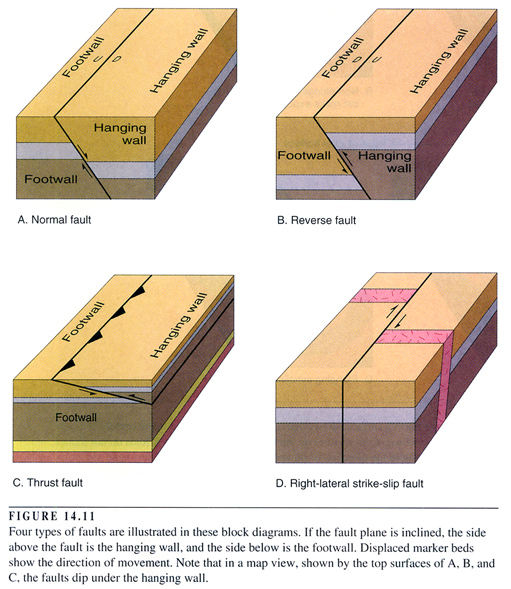In a normal fault the hanging wall moves downward relative to the footwall.
Normal fault hanging wall movement.
Thrust faults are reverse faults that dip less than 45.
These are often found in intensely deformed.
Faults showing vertical movement include tensional normal and compressional reverse faults.
They are caused by extensional tectonics.
Normal faults are common.
Faults are classified according to the direction of relative movement along the fault.
The hanging wall moves up and over the footwall.
An upthrown block between two normal faults dipping away from each other is a horst.
In a normal fault the hanging wall moves downwards relative to the foot wall.
Faults are subdivided according to the movement of the two blocks.
Tensional faults are produced through tension extension or pulling apart of the crust causing the hanging wall to move down relative to the footwall.
Reverse dip slip faults result from horizontal compressional forces caused by a shortening or contraction of earth s crust.
In this type of fault the hanging wall and footwall are pushed together and the hanging wall moves upward along the fault relative to the footwall.
They are identified by the relative movement of the hanging wall and foot wall.
Other articles where normal fault is discussed.
Low angle normal faults with regional tectonic significance may be designated detachment faults.
We distinguish between dip slip and strike slip hanging wall movements.
The forces creating reverse faults are compressional pushing the sides together.
This is literally the reverse of a normal fault.
The hanging wall slides down relative to the footwall.
A downthrown block between two normal faults dipping towards each other is a graben.
There are three or four primary fault types.
They are common at convergent boundaries.
The terms hanging wall and foot wall refer to the relative position of the plates after movement.
Dip slip movement occurs when the hanging wall moved predominantly up or down relative to the footwall.
Hanging wall movement determines the geometric classification of faulting.
Thrust faults with a very low angle of dip and a very large total displacement are called overthrusts or detachments.
A fault trace is also the line commonly plotted on geologic maps to represent a fault.
Together normal and reverse faults are called dip slip faults because the movement on them occurs along the dip direction either down or up respectively.
A dip slip fault in which the block above the fault has moved downward relative to the block.
If the motion was down the fault is called a normal fault if the movement was up the.
Normal faults and reverse faults are dip slip faults they experience vertical movement in line with the dip of the fault.
Reverse faults form when the hanging wall moves up.
Fault types three main types of faults.

